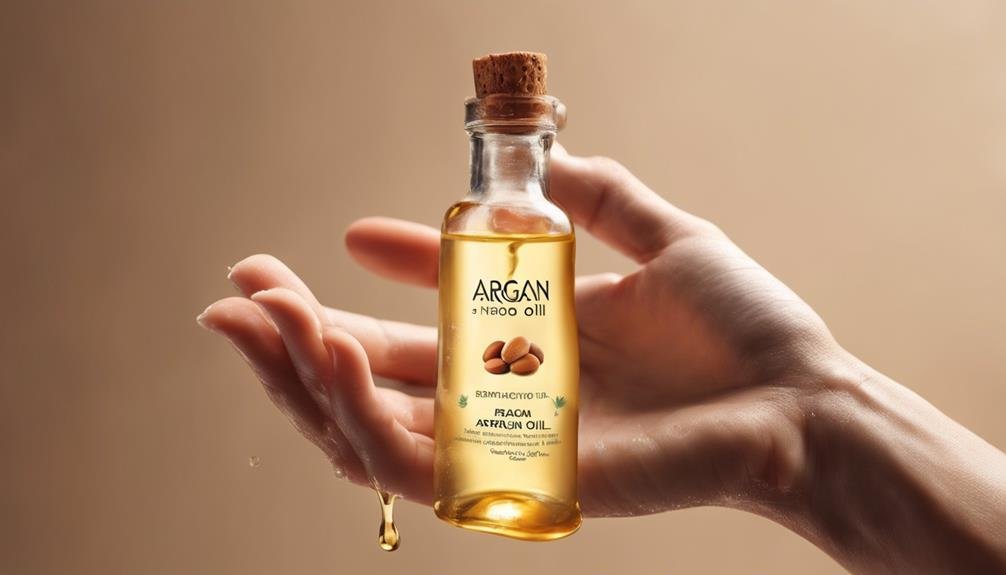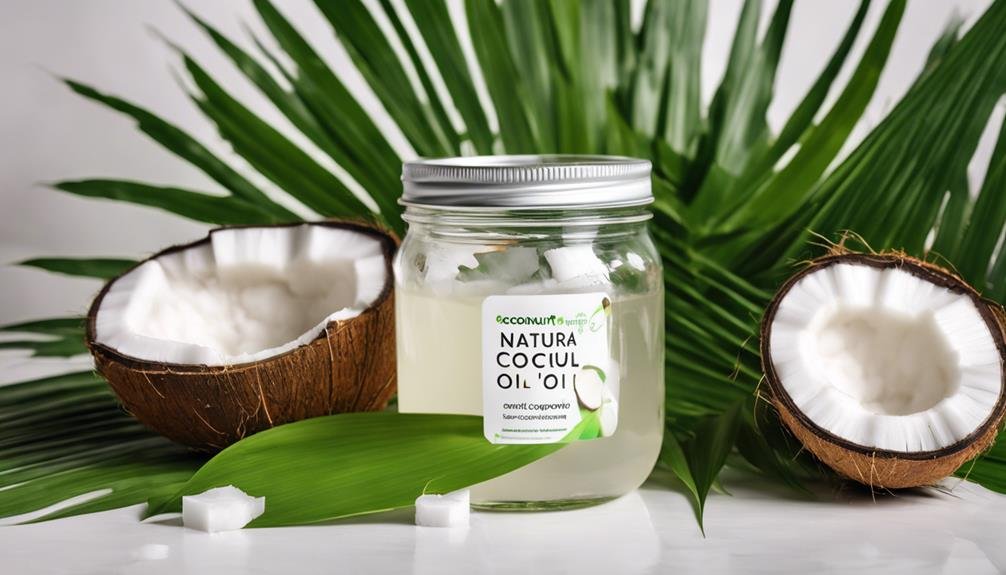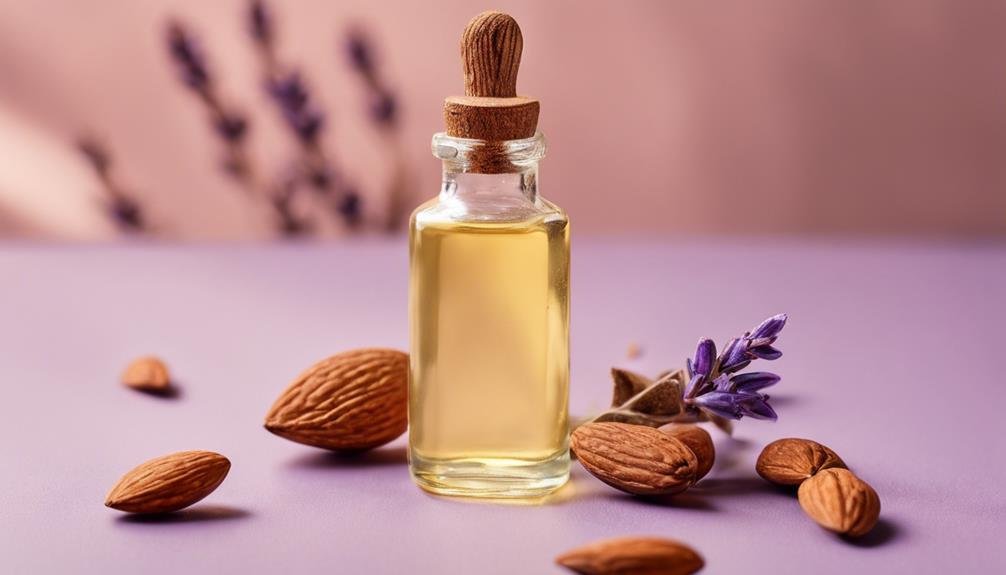If you're struggling with skin issues and looking for a natural solution, consider exploring the benefits of incorporating natural oils into your skincare routine. These oils offer a unique approach to achieving clear and radiant skin, but the key lies in understanding which oils work best for your specific needs. From combating acne to providing hydration and nourishment, natural oils can be a game-changer in your quest for healthier skin. So, why not explore the world of natural oils and discover the transformative effects they can have on your complexion?
Key Takeaways
- Jojoba oil: non-comedogenic, antibacterial, and anti-inflammatory properties combat acne.
- Tea tree oil: treats acne with antibacterial and anti-inflammatory effects, unclogs pores, reduces redness.
- Rosehip oil: improves skin texture, reduces scars, and evens skin tone with healing properties.
- Argan oil: deeply moisturizes, nourishes, and protects skin with essential fatty acids and antioxidants.
- Hemp seed oil: balances sebum production, moisturizes, and reduces inflammation with essential nutrients.
Benefits of Natural Oils
Have you ever wondered why natural oils are becoming increasingly popular in skincare routines? Natural oils offer a plethora of benefits for your skin. They're rich in vitamins, antioxidants, and essential fatty acids that nourish and hydrate your skin, promoting a healthy and radiant complexion. Different oils have unique properties that cater to various skin concerns, such as dryness, inflammation, and aging.
One of the key advantages of natural oils is their ability to balance the skin's natural oil production. Contrary to popular belief, using oils on oily skin can actually help regulate sebum production, preventing excess oiliness and breakouts. Additionally, natural oils have anti-inflammatory and antibacterial properties that can soothe irritated skin and combat acne-causing bacteria.
Jojoba Oil for Acne
Natural oils like jojoba oil have gained recognition for their potential in addressing acne concerns. Jojoba oil closely resembles the natural oils produced by our skin, making it an excellent option for those dealing with acne. Its non-comedogenic properties mean that it won't clog pores, making it suitable for all skin types, including oily and acne-prone skin.
Jojoba oil possesses antibacterial properties that can help combat the bacteria responsible for acne breakouts. It also has anti-inflammatory effects, which can reduce redness and swelling associated with acne. Additionally, jojoba oil is rich in vitamins E and B-complex, essential for skin repair and regeneration.
To incorporate jojoba oil into your skincare routine for acne, apply a few drops to clean, dry skin and gently massage it in. You can use it alone or mix a few drops with your moisturizer. Remember to do a patch test first to ensure you don't have any adverse reactions.
Tea Tree Oil Benefits
Tea tree oil, extracted from the leaves of the Melaleuca alternifolia tree, is renowned for its numerous benefits in skincare. This essential oil possesses powerful antibacterial and anti-inflammatory properties, making it a popular choice for treating acne. Its ability to unclog pores and reduce redness and swelling associated with acne makes it a potent natural remedy for clearer skin.
Tea tree oil is also effective in soothing various skin irritations, such as eczema and psoriasis, due to its calming and healing properties.
Moreover, tea tree oil is known for its antifungal properties, which can help combat fungal infections like athlete's foot and nail fungus. Its natural astringent properties can also assist in controlling excess oil production on the skin, making it beneficial for those with oily or combination skin types.
When using tea tree oil, it's crucial to dilute it with a carrier oil to prevent skin irritation and perform a patch test before applying it to larger areas of the skin.
Rosehip Oil for Scars
With its impressive healing properties and ability to improve skin texture, rosehip oil is a popular choice for addressing scars. Rosehip oil is rich in essential fatty acids, such as omega-3 and omega-6, which help repair damaged skin and promote cell regeneration. These fatty acids also aid in reducing the appearance of scars by smoothing out the skin's texture and promoting a more even skin tone.
When applied topically, rosehip oil can deeply penetrate the skin and work on reducing the visibility of scars over time. Its high content of vitamins A and C further contribute to its scar-fading abilities by boosting collagen production and brightening the skin. Additionally, the anti-inflammatory properties of rosehip oil can help calm irritated skin and reduce redness often associated with scarring.
To effectively use rosehip oil for scars, apply a few drops to the affected area and gently massage it into the skin. Consistent use can lead to noticeable improvements in the appearance of scars, making rosehip oil a valuable addition to your skincare routine.
Argan Oil for Hydration
Rich in essential fatty acids and antioxidants, argan oil is a versatile skincare ingredient known for its exceptional hydrating properties. When it comes to nourishing your skin, argan oil can work wonders. Here are a few reasons why you should consider incorporating this liquid gold into your skincare routine:
- Deep Hydration: Argan oil penetrates deeply into the skin, providing intense moisture that helps keep your skin supple and smooth.
- Nourishing Nutrients: Packed with vitamins and minerals, argan oil nourishes and revitalizes your skin, giving it a healthy and radiant glow.
- Protective Barrier: The natural emollient properties of argan oil create a protective barrier on the skin, shielding it from environmental stressors and locking in moisture.
Lavender Oil for Calming
Boasting a reputation for its soothing properties, Lavender Oil is a popular choice in skincare for its calming effects on the skin. Lavender Oil is well-known for its ability to reduce redness and inflammation, making it a go-to option for those with sensitive or irritated skin. Its anti-inflammatory and antioxidant properties help to soothe and nourish the skin, promoting a clear and healthy complexion.
When applied topically, Lavender Oil can aid in reducing stress and anxiety due to its calming aroma. This makes it not only beneficial for the skin but also for relaxation and overall well-being. Its gentle nature makes it suitable for all skin types, including those with acne-prone or aging skin.
To incorporate Lavender Oil into your skincare routine, consider adding a few drops to your favorite moisturizer or using it in a DIY face mask. Remember to perform a patch test before using it on your face to ensure compatibility with your skin.
Coconut Oil for Cleansing
Known for its versatile properties in skincare, Coconut Oil has gained popularity as a natural option for cleansing the skin effectively. This oil not only removes impurities but also nourishes your skin, leaving it soft and hydrated.
Coconut Oil Benefits for Cleansing:
- Gentle Makeup Remover: Coconut oil can effortlessly dissolve even stubborn waterproof makeup, making your evening skincare routine a breeze.
- Balances Skin's Natural Oils: Contrary to popular belief, coconut oil can help regulate sebum production, preventing excessive oiliness without stripping the skin.
- Antibacterial Properties: With its natural antibacterial properties, coconut oil can help combat acne-causing bacteria, reducing breakouts and promoting clearer skin.
Integrate coconut oil into your skincare regimen by massaging a small amount onto dry skin, then gently wiping it away with a warm washcloth. Experience the cleansing power of coconut oil while giving your skin the tender care it deserves.
Grapeseed Oil for Brightening
To further enhance your skincare routine and target specific concerns, consider incorporating Grapeseed Oil for its brightening properties. Grapeseed Oil is a lightweight and non-comedogenic oil extracted from the seeds of grapes. Rich in antioxidants, vitamins C and E, and linoleic acid, Grapeseed Oil is known for its ability to brighten the skin and even out skin tone.
The antioxidants in Grapeseed Oil help protect the skin from free radicals that can cause dullness and discoloration. Vitamin C boosts collagen production, enhancing skin radiance and brightness. Vitamin E aids in repairing and nourishing the skin, promoting a healthy glow. Linoleic acid helps to maintain the skin's moisture barrier, preventing dryness and flakiness that can contribute to a lackluster complexion.
To incorporate Grapeseed Oil into your skincare routine, simply apply a few drops to clean, damp skin or mix it into your favorite moisturizer. With consistent use, you may notice a more radiant and luminous complexion as Grapeseed Oil works its brightening magic.
Almond Oil for Nourishment
Almond Oil is a versatile and nourishing oil that can benefit your skin in various ways. Extracted from almonds, this oil is rich in vitamins and minerals that promote skin health. Here are some reasons why incorporating almond oil into your skincare routine can work wonders for your skin:
- Deep Hydration: Almond oil penetrates deeply into the skin, providing intense hydration and helping to maintain the skin's moisture balance.
- Nourishment: Packed with essential fatty acids and antioxidants, almond oil nourishes the skin, leaving it soft, smooth, and supple.
- Improves Skin Tone: Regular use of almond oil can help even out skin tone and reduce the appearance of dark spots and discoloration.
With its lightweight texture and non-comedogenic properties, almond oil is suitable for all skin types, including sensitive and acne-prone skin. Consider adding almond oil to your skincare regimen for nourished, healthy-looking skin.
Hemp Seed Oil Benefits
Rich in essential nutrients and omega fatty acids, Hemp Seed Oil is a powerhouse ingredient for promoting clear and healthy skin. This natural oil is packed with antioxidants, vitamins, and minerals that work together to nourish and protect your skin.
The omega-3 and omega-6 fatty acids present in Hemp Seed Oil help to regulate oil production, making it an excellent choice for all skin types, including oily and acne-prone skin.
Hemp Seed Oil is also known for its anti-inflammatory properties, which can help reduce redness and irritation caused by skin conditions like eczema and psoriasis. Its moisturizing effects can improve skin elasticity and hydration, leaving your skin looking radiant and youthful.
Additionally, the linoleic acid in Hemp Seed Oil can help balance sebum production, preventing clogged pores and breakouts.
Evening Primrose Oil Effects
Evening Primrose Oil, with its high concentration of gamma-linolenic acid (GLA), offers a range of benefits for maintaining clear and healthy skin. This natural oil can work wonders for your skin due to its unique properties. Here are some effects of Evening Primrose Oil that you might find compelling:
- Soothing Irritation: The anti-inflammatory properties of Evening Primrose Oil can help calm redness and irritation on your skin, providing relief for sensitive or acne-prone skin.
- Moisturizing: By enhancing the skin's moisture barrier, Evening Primrose Oil can help lock in hydration, leaving your skin feeling supple and nourished.
- Balancing Hormones: Some studies suggest that the GLA in Evening Primrose Oil may help balance hormones, potentially reducing hormonal acne breakouts.
Incorporating Evening Primrose Oil into your skincare routine could be a gentle yet effective way to promote clear and radiant skin.
Marula Oil for Anti-Aging
Looking for a natural solution to combat signs of aging? Marula oil might just be the answer you've been searching for.
This luxurious oil, extracted from the kernels of the Marula fruit, is rich in antioxidants and essential fatty acids that can help rejuvenate your skin and reduce the appearance of wrinkles and fine lines.
Marula oil is packed with vitamins C and E, which can help protect your skin from free radical damage and promote collagen production, leading to firmer and more youthful-looking skin. Its lightweight and fast-absorbing texture make it suitable for all skin types, including oily and acne-prone skin.
Studies have shown that Marula oil has hydrating and anti-inflammatory properties, making it a versatile ingredient that can nourish your skin while soothing any irritation or redness. By incorporating Marula oil into your skincare routine, you can benefit from its anti-aging effects and achieve a smoother, more radiant complexion. Treat your skin to the natural wonders of Marula oil and embrace a youthful glow.
Frequently Asked Questions
Can Natural Oils Cause Allergic Reactions on Sensitive Skin?
Yes, natural oils can cause allergic reactions on sensitive skin. It's essential to do a patch test before using any new oil. Look for non-comedogenic options like jojoba or squalane and consult a dermatologist if unsure.
Are There Any Natural Oils to Avoid for Oily Skin Types?
When dealing with oily skin, avoid heavy oils like coconut or olive oil that can clog pores. Opt for lighter oils such as jojoba or grapeseed, which are less likely to exacerbate oiliness and can help balance skin.
How Should Natural Oils Be Stored to Maintain Their Potency?
To maintain the potency of natural oils, store them in a cool, dark place away from direct sunlight and heat sources. Seal the containers tightly to prevent oxidation. This will help preserve the effectiveness of the oils for longer periods.
Can Natural Oils Be Used in Combination With Other Skincare Products?
You wonder if natural oils can mingle with skincare products. Yes, they can! Mixing oils like rosehip or jojoba with serums adds a hydrating boost. For a glowing complexion, blend them wisely. Your skin will thank you!
Are There Any Side Effects of Using Natural Oils on the Face?
Using natural oils on your face can lead to side effects like clogged pores, breakouts, or allergic reactions. It's important to do a patch test before full application. Consult a dermatologist if concerns arise.
Conclusion
In the garden of skincare, natural oils are the nourishing soil that cultivates clear, radiant skin. From the calming breeze of jojoba to the healing touch of rosehip, each oil plays a vital role in maintaining a healthy complexion. Embrace the power of these botanical elixirs to unlock the beauty within and let your skin bloom like a vibrant flower in full bloom. Trust in the wisdom of nature to guide you on the path to clear, glowing skin.







